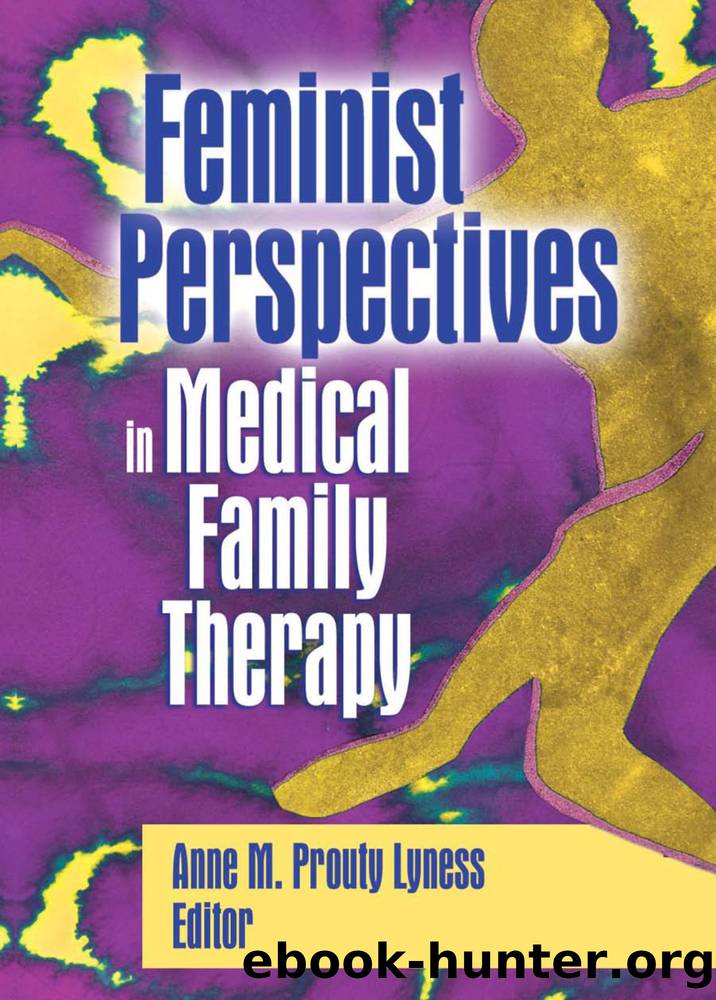Feminist Perspectives in Medical Family Therapy by Unknown

Author:Unknown
Language: eng
Format: epub
Publisher: Taylor & Francis Group
Published: 2022-08-15T00:00:00+00:00
Conclusion
Our perspective and supervisory methods come not only from our experiences as feminist family therapists (MED and SP) and as feminist health communication scholars (KAZ and JSK), but also may be informed by our experiences of marginalization as nonphysician women working in a largely male, patriarchal medical school. Feminist standpoint epistemology maintains that persons with less power must know not only their own culture, but also how to survive in the dominant culture, whereas the dominant group doesn't have to learn the culture of the less powerful (Harding, 1993). We are in this standpoint position as women and nonphysician facultyâtrained in our own disciplines, but needing to survive within the medical education system, a system we did not personally experience as learners. This position likely highlights issues of marginalization and oppression that may be experienced by patients, residents, and women and minority faculty when interacting with a complex, patriarchal medical education and healthcare system.
Medical education has been compared to a neglectful and abusive family system because of the unrealistic expectations, denial, indirect communication patterns, rigidity, and isolation that often exist (McKegney, 1989). We attempt to provide alternative experiences based on multiple ways of knowing, being-in-relation, reflection, and use of self. Learning a being-in-relation approach and shifting power is especially important when physicians are working with medically underserved and/or marginalized patients, or those who have historically been treated paternalistically by physicians (e.g., women, ethnic minorities, gay, lesbian, or bisexual patients). As physicians learn to shift these relationships, they become agents for social change through promoting more empowering relationships.
Feminist family therapists, then, bring important lenses to medical education: a systemic conceptual framework, and an understanding of power dynamics across patientsâ social contexts, the doctor-patient relationship, and in the resident-faculty relationship. These combined perspectives provide a much-needed but seldom taught view of the doctor-patient relationship and complex medical systems as circular and systemic, and highlight the importance of context, understanding the patientsâ narrative, and the self-of-the-physician in the helping relationship.
Feminist MFTs also bring an awareness of the need for physician reflection and mindfulness of their social location, the ethical use of power, an awareness of the sociopolitical context of medicine, and the potential for physicians to be agents for social change. Both practicum as a curriculum component, and feminist supervision and teaching methods are rare in medical education. Applying the practicum training model is a good example of how feminist MFTs can not only partner with physicians, but teach essential skills while also advocating for social change through more relationship-centered, empowering physician-patient relationships.
Download
This site does not store any files on its server. We only index and link to content provided by other sites. Please contact the content providers to delete copyright contents if any and email us, we'll remove relevant links or contents immediately.
| Administration & Medicine Economics | Allied Health Professions |
| Basic Sciences | Dentistry |
| History | Medical Informatics |
| Medicine | Nursing |
| Pharmacology | Psychology |
| Research | Veterinary Medicine |
Periodization Training for Sports by Tudor Bompa(8252)
Why We Sleep: Unlocking the Power of Sleep and Dreams by Matthew Walker(6699)
Paper Towns by Green John(5177)
The Immortal Life of Henrietta Lacks by Rebecca Skloot(4571)
The Sports Rules Book by Human Kinetics(4379)
Dynamic Alignment Through Imagery by Eric Franklin(4208)
ACSM's Complete Guide to Fitness & Health by ACSM(4051)
Kaplan MCAT Organic Chemistry Review: Created for MCAT 2015 (Kaplan Test Prep) by Kaplan(4001)
Introduction to Kinesiology by Shirl J. Hoffman(3765)
Livewired by David Eagleman(3763)
The Death of the Heart by Elizabeth Bowen(3605)
The River of Consciousness by Oliver Sacks(3598)
Alchemy and Alchemists by C. J. S. Thompson(3513)
Bad Pharma by Ben Goldacre(3420)
Descartes' Error by Antonio Damasio(3270)
The Emperor of All Maladies: A Biography of Cancer by Siddhartha Mukherjee(3144)
The Gene: An Intimate History by Siddhartha Mukherjee(3091)
The Fate of Rome: Climate, Disease, and the End of an Empire (The Princeton History of the Ancient World) by Kyle Harper(3055)
Kaplan MCAT Behavioral Sciences Review: Created for MCAT 2015 (Kaplan Test Prep) by Kaplan(2980)
